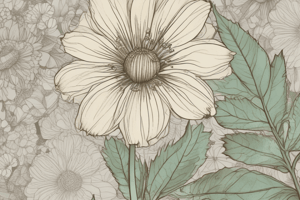Podcast
Questions and Answers
What holds the seeds in a flower?
What holds the seeds in a flower?
- Style
- Ovary (correct)
- Pistil
- Stamen
What is the female part of a plant called?
What is the female part of a plant called?
Pistil
What part catches the pollen to pollinate the seeds in the ovary?
What part catches the pollen to pollinate the seeds in the ovary?
Stigma
What is the tube that the pollen travels through?
What is the tube that the pollen travels through?
What part of the flower is the male structure?
What part of the flower is the male structure?
Where is pollen created?
Where is pollen created?
What holds the anther up?
What holds the anther up?
What part of the flower covers and protects the bud?
What part of the flower covers and protects the bud?
What are the colorful 'leaves' that attract animals called?
What are the colorful 'leaves' that attract animals called?
What holds the plant or flower up?
What holds the plant or flower up?
What part of the plant anchors it to the ground and absorbs water and nutrients?
What part of the plant anchors it to the ground and absorbs water and nutrients?
Flashcards
Pistil
Pistil
The female reproductive part of a flower, responsible for producing seeds.
Stigma
Stigma
The sticky top of the pistil that catches pollen.
Style
Style
The tube connecting the stigma to the ovary, through which pollen travels.
Ovary
Ovary
Signup and view all the flashcards
Stamen
Stamen
Signup and view all the flashcards
Anther
Anther
Signup and view all the flashcards
Filament
Filament
Signup and view all the flashcards
Sepals
Sepals
Signup and view all the flashcards
Petals
Petals
Signup and view all the flashcards
Stem
Stem
Signup and view all the flashcards
Roots
Roots
Signup and view all the flashcards
Study Notes
Flower Structure and Functions
- Ovary: Responsible for holding seeds, essential for plant reproduction.
- Pistil: The female reproductive part of the flower, containing the ovary, style, and stigma.
- Stigma: A crucial component that catches pollen, facilitating pollination of seeds within the ovary.
- Style: The tube-like structure that allows pollen to travel from the stigma to the ovary, playing a vital role in reproduction.
- Stamen: The male reproductive part of the flower, consisting of the anther and filament.
- Anther: The location where pollen is produced, serving as a source of male gametes.
- Filament: A supportive structure that holds the anther in position, ensuring effective pollen dispersion.
- Sepals: Protective leaf-like structures that cover and shield the flower bud before blooming.
- Petal: Colorful leaf-like components that attract pollinators such as insects and birds, aiding in the pollination process.
- Stem: Provides structural support to the plant or flower, elevating it for better sunlight exposure.
- Roots: Anchors the plant securely in the soil while absorbing water and nutrients, essential for growth and survival.
Studying That Suits You
Use AI to generate personalized quizzes and flashcards to suit your learning preferences.
Description
Test your knowledge of flower anatomy with these flashcards designed for 6th-grade science. Each card highlights important flower parts, including the ovary, pistil, stigma, and more. Perfect for reinforcing learning about plant biology and reproduction.




